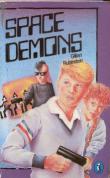 9205904087310986802.jpg
9205904087310986802.jpg
 9205904087310986802.jpg
9205904087310986802.jpg
'Space Demons is a computer game with a difference - a prototype directly imported from Japan, and designed to lock four unlikely protagonists, Andrew Hayford, Elaine Taylor, Ben Challis and Mario Ferrone, in deadly combat with the sinister forces of its artificial intelligence. As the game draws them into its powerful ambit, Andrew, Elaine, Ben, and Mario must confront the darker sides of their own natures.' (Publication summary)
 Elements of Carnival and the Carnivalesque in Contemporary Australian Children's Literature
Sydney
:
2009
27495428
2009
single work
thesis
Elements of Carnival and the Carnivalesque in Contemporary Australian Children's Literature
Sydney
:
2009
27495428
2009
single work
thesis
'This thesis discusses the influence of elements of Bakhtinian camivalesque in selected contemporary Australian children’s literature. Many of the Bakhtinian ideas are centred on the work of Franqois Rabelais, particularly his five books collectively entitled Gargantua and Pantagruel. Aspects of the complex field of Bakhtinian camivalesque that have been considered include: attitudes to authority, the grotesque body and its working, the importance of feasting and the associated concepts of bodily functioning, customs in relation to food, and ritual and specific language such as the use of curses and oaths. The role of humour and the manifest forms this takes within carnival are intrinsic and are discussed at some length. These central tenets are explored in two ways: first, in relation to their connection and use within the narrative structures of a selection of books short listed (and thus critically acclaimed) by the Australian Children’s Book Council from the early 1980s to the early 2000s, and second, by means of contrast, to the commercially popular but generally less critically acclaimed works of other Australian writers such as Paul Jennings and Andy Griffiths. The thesis concludes by considering the ways in which camivalesque freedom is encouraged through and by new media.'
Source: Abstract.
 Meet the Author : Gillian Rubinstein
Meet Gillian Rubinstein
Sue Wighton
(interviewer),
( dir. Sue Wighton
)
Brisbane
:
Queensland Department of Education
,
1993
Z1376174
1993
single work
film/TV
interview
Meet the Author : Gillian Rubinstein
Meet Gillian Rubinstein
Sue Wighton
(interviewer),
( dir. Sue Wighton
)
Brisbane
:
Queensland Department of Education
,
1993
Z1376174
1993
single work
film/TV
interview
Children's author Gillian Rubinstein discusses the inspiration behind some of her stories, notably Space Demons and Answers to Brut. She also answers questions from students.